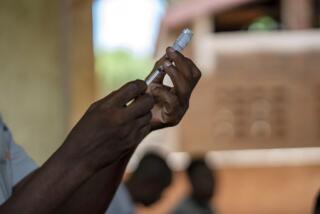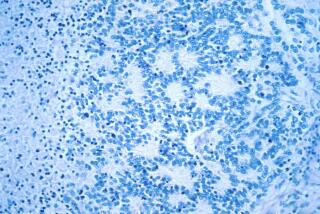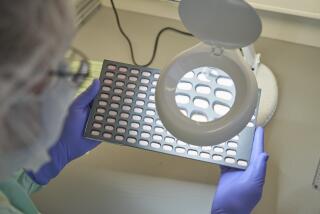AIDS Drug Trial in Children Shows Promise
- Share via
GENEVA — The first large study of an investigational AIDS drug in children has shown that the drug, called abacavir, can successfully treat many who have become resistant to other drugs, researchers will report here today at the 12th World AIDS Congress.
The results, the first ever from a child-based study submitted to the Food and Drug Administration in support of approving an AIDS drug, “set an important precedent” toward including children in more early trials, said Dr. Russell Van Dyke of Tulane University in New Orleans, lead author of the study.
AIDS trials in children are usually performed long after a drug has been approved for adults because children have an immature and developing immune system, which makes assessing the drug’s value more difficult. Children also metabolize the drugs at different rates than adults, which has to be taken into account when calculating effective doses.
But the researchers were able to overcome those obstacles in this research.
The trial enrolled 205 children between the ages of 3 months and 12 years. All had undergone prior therapy for at least 12 weeks, and more than half for at least two years. Half of the children received the well-studied combination of AZT and 3TC, while the rest received those two drugs plus abacavir, a drug developed by Glaxo Wellcome Inc.
Van Dyke will report that 13% of those receiving abacavir had virus levels in their blood fall to below detectable values--about 40 virus copies per milliliter of blood--compared with only 2% of those receiving just the two drugs. Overall, 49% of those receiving abacavir showed a significant response, with virus levels dropping below 10,000 copies per milliliter compared with 35% of those receiving AZT plus 3TC.
These results suggest that abacavir will benefit HIV-positive children who are failing therapy with other drugs.
Other work presented at the meeting suggests that abacavir can be used in place of protease inhibitors in multi-drug cocktails for those newly diagnosed as HIV-positive. Although the much-celebrated protease inhibitors have provided a major advance in treating HIV infections, their long-term use is beginning to reveal side effects, including abnormal fat accumulations, higher cholesterol levels and even diabetes. Some physicians would like to reserve their use for patients who have failed other therapies.
Dr. Margaret Fischl of the University of Miami will report on a trial that tested 3TC, AZT and abacavir in 72 previously untreated HIV-positive people. After 16 weeks on the regimen, 86% had virus levels below 400 copies per milliliter and 67% had levels below 50 copies per milliliter.
The regimen has the additional advantage of requiring the patients to take only six pills per day, a distinct improvement over some current protocols that require as many as 20 per day. A variety of evidence has shown that patients are more likely to adhere to regimens with fewer doses, and are thus more likely to sustain improvements.
Dr. Giuseppe Pantaleo of Centre Hospitalier in Lausanne, Switzerland, reported Sunday on a regimen that requires only four pills per day. His group treated 41 HIV-positive patients with abacavir and amprenavir, another investigational drug developed by Glaxo.
*
At the end of 48 weeks, 100% of the patients who were able to tolerate the therapy had viral levels below 500 copies per milliliter and 80% had levels below 50 copies per milliliter. (Two patients dropped out of the study.)
The patients’ levels of CD4 white blood cells, an indicator of the progression of the infection, had returned to near-normal, Pantaleo said. “We basically observed a restoration of the immune system,” he added.
Also on Sunday, the International AIDS Vaccine Initiative announced that it hoped to spend $300 million to $500 million over the next nine years to accelerate the production of an AIDS vaccine. The group, a private foundation, also announced that Microsoft Corp. Chairman Bill Gates and his wife, Melinda, were contributing $1.5 million toward the goal. The World Bank also raised its commitment to the vaccine initiative to $1 million this year, from $200,000 last year.
Most experts believe that a vaccine is the only way to stop the accelerating spread of AIDS in developing countries. “The world is not on track to meet the goal of a safe and effective vaccine in the next decade,” said Margaret Johnston, IAVI’s vice president for scientific affairs. “This [initiative] will not only put us back on track; it will put us on a fast track.”






